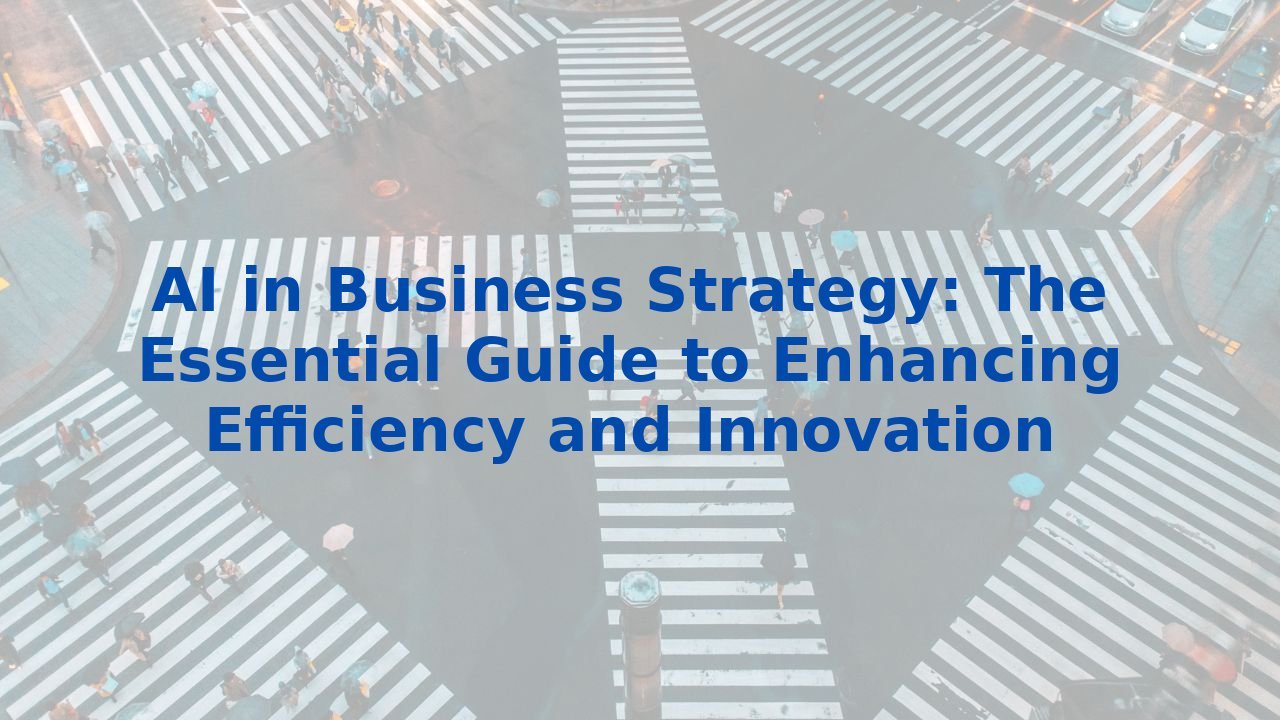AI in Business Strategy: The Essential Guide to Enhancing Efficiency and Innovation
AI in Business Strategy: The Essential Guide to Enhancing Efficiency and Innovation
Artificial Intelligence (AI) is no longer a futuristic concept; it has become a fundamental component of modern business strategy. Organizations that adopt AI are not just enhancing operational efficiency—they're reshaping their entire approach to decision-making and innovation. Let’s explore how AI revolutionizes traditional business processes and why it's vital for employees to receive comprehensive training in this new paradigm.
How AI Enhances Business Processes
From marketing to supply chain management and customer service, AI’s impact is profound and far-reaching. Here’s a closer look at how AI enhances these core business functions:
Marketing and Personalization
AI empowers businesses to create personalized marketing strategies by sifting through mountains of customer data. This capability allows enterprises to tailor their campaigns, recommend products, and engage customers in ways that were unimaginable just a few years ago. AI can analyze user behavior patterns, optimize advertising efforts for specific demographics, and even engage customers through social media, providing a highly personalized experience that drives satisfaction and loyalty.
Supply Chain Management
In an era where efficiency is non-negotiable, AI optimizes inventory management by predicting demand fluctuations. Real-time tracking through smart sensors ensures visibility across the entire supply chain, while predictive analytics facilitates accurate demand forecasting. This reduces waste and mitigates risks associated with stockouts or excess inventory, ensuring that organizations run like well-oiled machines.
Customer Service
AI-powered chatbots are revolutionizing customer service by handling routine inquiries and offering immediate responses. These digital assistants not only manage communication but can also sync with calendars and even suggest recommendations based on customer interactions. By automating low-value tasks, businesses can elevate the customer experience while empowering employees to focus on strategic pursuits.
The Benefits of AI for Improving Efficiency
Integrating AI into business processes comes with a plethora of benefits, particularly regarding efficiency and productivity. Let’s delve deeper into these advantages:
Efficiency and Productivity
AI excels at automating repetitive tasks, such as data analysis and report generation, freeing up human resources for more valuable work. This automation doesn’t just lead to reduced operational costs; it accelerates productivity metrics across the board. Businesses can process data at speeds human labor cannot match, providing actionable insights more swiftly, which is crucial for informed decision-making.
Data-Driven Insights
The capability of AI to analyze vast datasets is transforming how businesses interpret data. Instead of relying solely on manual analysis—which can be time-consuming and error-prone—AI generates real-time data insights and predictive analytics, allowing companies to anticipate costs, recognize potential supply chain disruptions, and accurately forecast product demand. This responsiveness is critical in today’s fast-paced market environment.
Personalized Customer Experiences
By leveraging AI to analyze customer data, businesses can curate personalized experiences that resonate with individual preferences. This not only enhances customer satisfaction but also boosts brand loyalty. When customers receive tailored communications and recommendations, they are more likely to engage consistently, driving retention rates through the roof.
The Importance of Training Employees for AI
While AI can perform many tasks independently, the importance of training employees to work effectively alongside these technologies cannot be overstated. Here’s why:
Understanding AI Capabilities
Training ensures that employees comprehend both the potential and limitations of AI. This understanding is essential for integrating AI solutions effectively into their workflows, maximizing the efficiency gains provided by these innovations. Knowledge empowers employees, enabling them to leverage the technology to its fullest potential.
Enhancing Collaboration
When employees grasp how AI systems function, it fosters seamless collaboration between humans and machines. This synergy is crucial for unlocking the full advantages of AI and enhances overall productivity as employees navigate the complexities of this new technology landscape.
Upskilling for New Roles
As AI takes over routine tasks, new opportunities emerge that demand different skill sets. Equipping employees with the right training prepares them for these new roles, ensuring they remain relevant in an evolving workforce. Upskilling provides pathways to higher-value functions, such as strategic planning and complex decision-making, where human insight is irreplaceable.
Conclusion
AI is reshaping the very fabric of business operations, driving efficiency, delivering valuable insights, and personalizing customer experiences. Organizations that embrace AI's potential not only streamline their processes but also position themselves for long-term success. However, to navigate this transformative journey effectively, investing in comprehensive AI training for employees is crucial. Together, these strategies set the stage for profound growth in an ever-evolving marketplace.



